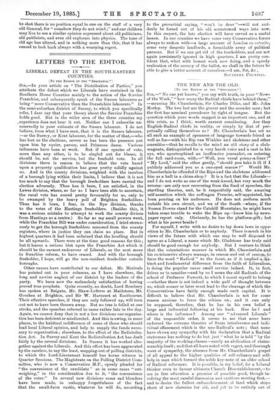LETTERS TO THE EDITOR.
LIBERAL DEFEAT IN THE SOUTH-EASTERN COUNTIES.
LTO THE EDITOR OF THE " SPECTATOR...1
SIR,—In your article on " The Distribution of Parties," you attribute the defeat which we Liberals have sustained in the Southern Home Counties mainly to the action of the Service Franchise, and subsequently speak of the Sussex labourers as being " more Conservative than the Dorsetshire labourers." In the semi-suburban district of Surrey, to which you specifically refer, I dare say that your theory about the Service Franchise holds good. But in the wider area of the three counties my „experience does not bear it out. Neither can I subscribe un- reservedly to your estimate of the Sussex labourer. I do not believe, from what I have seen, that it is the Sussex labourer, —or the Surrey, or Kent labourer, for the matter of that,—who has lost us the elections, severe as has been the pressure put upon him by squire, parson, and Primrose dame. Various influences have been at work. But if one species of vote, more than any other, is to be singled out for blame, it should be, not the service, but the freehold vote. In all divisions there is reason to believe that the vote based upon a property qualification has gone pretty solidly against us. And in the county divisions, weighted with the incubus of a borough lying within their limits, I believe that it is not too much to say that the borough freeholders have carried the -election adversely. Thus has it been, I am satisfied, in the Lewes division, where, so far as I have been able to ascertain, the rural vote has scored pretty favourably for us, only to be swamped by the heavy poll of Brighton freeholders. Thus has it been, I fear, in the Rye division, thanks to the votes of the Hastings freeholders. (Besides this, it was a serious mistake to attempt to work the county divison from Hastings as a centre.) So far as my small powers went, while the Franchise Bill was under consideration, I tried strenu- ously to get the borough freeholders removed from the county registers, where in justice they can claim no place. But in highest quarters it had been ordained that the levelling should be all upwards. There were at the time good reasons for this ; but it leaves a serious blot upon the Franchise Act which it should be the earnest endeavour of Liberals, as the next move in franchise reform, to have erased. And with the borough freeholder, I hope, will go the non-resident freeholder outside boroughs.
Other causes have contributed to our defeat. Mr. Merivale has pointed out in your columns, as I have elsewhere, the long and unwise neglect of our district by the leaders of the party. We have now the melancholy satisfaction of having proved true prophets. Quite recently, no doubt, Lord Rosebery has spoken at Reigate, Mr. Shaw-Lefevre at Maidstone, Mr. .Goschen at Brighton, and Sir W. Harcourt at Eastbourne. Their effective speeches, if they are only followed up, will turn .out not to have been thrown away. But no tree is felled at one stroke, and the speeches referred to came rather late in the day. Again, we cannot deny that in not a few divisions our organisa- tion has been deficient or misdirected. And this is owing, in some places, to the habitual indifference of some of those who should lead local Liberal opinion, and help to supply the funds neces- sary to organisation ; elsewhere, to the effect of the Redistribu- tion Act. In Surrey and Kent the Redistribution Act has dealt fairly by the several divisions. In Sussex it has worked alto- gether against the Liberals. And this effect has been aggravated by the careless, to say the least, mapping-out of polling districts, to which the Lord-Lieutenant himself has borne witness in Quarter Sessions. The Magistrate on the Polling District Com- mittee, who is now a Conservative M.P., openly pleaded for " the convenience of the candidate " as in some cases " out- weighing," in the consideration due to it, "the convenience of the voter." In. several new divisions some sad blunders have been made, in unhappy forgetfulness of the fact that the small-farm rustic, whatever he will do, according to the proverbial saying, " won't be druv "—will not sud- denly be forced out of his old accustomed ways into new. In this respect, the late election will have served as a useful lesson. In our counties we have some very Conservative forces always to reckon with—a large amount of London en retraile, some very despotic landlords, a formidable army of political parsons. But if we can get rid of the freeholders, and are not again persistently ignored in high quarters, I am pretty con- fident that, what with honest work now doing, and a speedy realisation of the secrecy of the ballot, we shall in the future be able to give a better account of ourselves.—I am, Sir, &c , SOUTHERN COUNTIES.










































 Previous page
Previous page